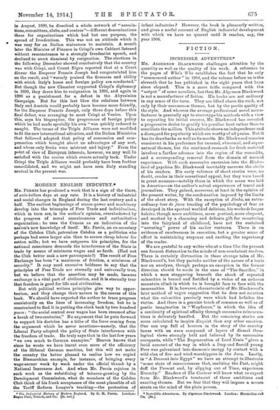MODERN ENGLISH INDUSTRY.*
Ma. PERRIS has produced a work that is a sign of the times, of ante-bellum days at any rate. It is a history of industrial and social changes in England during the last century and a half. The earliest beginnings of steam-power and machinery develop into the triumphs of Free Trade and individualism, which in turn are, in the author's opinion, overshadowed by the progress of moral consciousness and authoritative organization : be uses the Census as an indication of the nation's new knowledge of itself. Mr. Perris, an ex-secretary of the Cobden Club, patronizes Cobden as a politician who perhaps had some larger aim than to secure cheap labour for cotton mills ; but we have outgrown his principles, for the national conscience demands the interference of the State in trade by means of minimum wages and so forth. (Had not the Club better seek a new patronymic F) The result of Free Exchange has been "a maximum of friction, a minimum of security." It may need excessive boldness to say that the principles of Free Trade are eternally and universally true, but we believe that the assertion may be made, because exchange is a vital part of civilization, and it is eternally true that freedom is good for life and civilization..
But with political writers principles give way to oppor- tunism, and they change their nature in the course of this book. We should have expected the author to trace progress consistently on the lines of increasing freedom, but he is constrained to find it in putting the clock back by two hundred years : " the social control over wages has been resumed after a break of two centuries." No argument that he puts forward to support his doctrine has a tithe of the force coming from the argument which he never mentions—namely, that the Liberal Party adopted the policy of State interference with the freedom of trade. He truly says that in the last few years "we owe much to German examples." Heaven knows that since he wrote we have learnt even more of the efficiency of the illiberal German machine, but this will not make the country the better pleased to realize how we copied the Bismarckian example, for instance, of bringing every wage-earner week by week under the official thumb by a National Insurance Act. And when Mr. Perris rejoices in such work as the subsidizing of tobacco-growing by the Development Commission, what do members of the Cobden Club think of his frank acceptance of the most plausible of all the Tariff Reform League's teaching—the protection of • The Industrial History of Modern England. By G. H. Perris. London: Megan Paul, Trench. and Co. [8a. net.]
infant industries P However, the book is pleasantly written, and gives a useful account of English industrial development with -which we have no quarrel until it reaches, say, the year 1906.






































 Previous page
Previous page